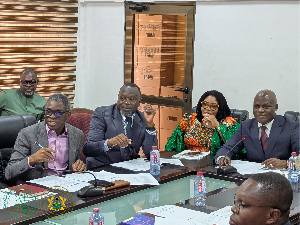The Inter-Ministerial Coordinating Committee (IMCC) on Decentralisation Secretariat convened the maiden meeting of the Decentralisation Sector Working Group (DSWG) since the inception of the new government.
The meeting brought together key representatives of the Government of Ghana (GoG) and Development Partners in a spirit of collaboration and a shared commitment to advancing Ghana’s decentralisation agenda.
In his opening remarks, Dr. Gameli Kewuribe Hoedoafia, the Executive Secretary of the Inter-Ministerial Coordinating Committee (IMCC) on Decentralisation, thanked members for their participation, noting that the high-level dialogue underscores the government’s dedication to deepening local governance and ensuring that decentralisation remains a key pillar of Ghana’s development agenda.
He emphasised that the DSWG is a high-level platform that enhances policy coordination, prevents duplication of efforts, and provides the space for policy dialogue between the Government of Ghana and Development Partners (DPs) to accelerate decentralisation reforms, ensure resource efficiency, and promote effective delivery of services at the local level.
He emphasised the critical role of Development Partners (DPs) in supporting Ghana’s vision for an efficient, transparent, and inclusive decentralisation and local governance process.
The meeting, which was held at the conference room of the Ministry of Local Government, Chieftaincy, and Religious Affairs, was chaired by the Minister for Local Government, Chieftaincy, and Religious Affairs.
Ahmed Ibrahim reaffirmed the government’s dedication to decentralisation under the Reset Agenda, emphasising that the 2024 electoral victory signified strong public endorsement of these reforms.
He noted that a primary focus of the government’s decentralisation agenda is the election of Metropolitan, Municipal, and District Chief Executives (MMDCEs) on a non-partisan basis. This is in response to the long-highlighted concern by civil society and other stakeholders about the undemocratic nature of the current appointment system.
The minister outlined several key priorities aimed at strengthening local governance. He underscored the government’s commitment to increase the share of the District Assemblies Common Fund (DACF) from 5% to 7.5%, ensuring equitable distribution to support development at the local level. He reiterated that, while this is in process, the President has directed the Administrator of the DACF to ensure the release of 80 percent of the fund budget directly to the District Assemblies in 2025.
Other focus areas include enhancing the roles of traditional and religious leaders, improving sanitation and waste management through policy reforms, and strengthening local governance structures. A significant initiative in this regard is the planned establishment of the University of Local Governance and Development aimed at providing specialised training for local government officials.
In his concluding remarks, the minister called for strong collaboration with Development Partners (DPs) to effectively implement these initiatives, ensuring sustainable decentralisation and improved governance across the country.
The Co-Chair of the DSWG, Ambassador Simone Giger, the Swiss Ambassador to Ghana, Togo, and Benin, emphasised the importance of decentralisation and local governance in Ghana. Drawing from personal experiences with decentralised governance in Switzerland, she stressed that an effective decentralisation system enhances responsiveness and accountability, particularly in a diverse nation like Ghana.
Expressing satisfaction with the government’s commitment to decentralisation, she noted ongoing engagements and Switzerland’s support for decentralisation and the Constitutional Review Committee. She remarked that the government and the minister were “talking the talk” and expressed optimism that these commitments would translate into tangible reforms.
Ambassador Giger concluded by pledging the unwavering support of Development Partners in achieving Ghana’s decentralisation objectives in line with national development priorities.
The meeting was also attended by the Attorney-General and Minister for Justice, Dominic Akuritinga Ayine, and the Minister for Gender, Children & Social Protection, Agnes Naa Momo Lartey.
The session concluded with a unified commitment to sustain collaboration, enhance coordination, undertake regular policy dialogue and review, and ensure the strengthening of institutional frameworks to enhance the implementation of Ghana’s National Decentralisation Policy and Strategy.



